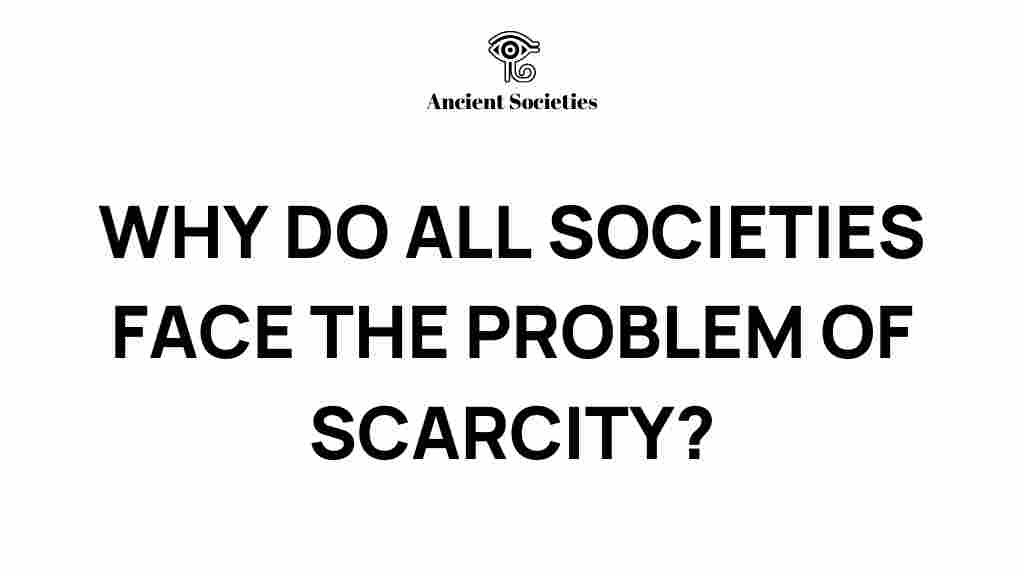The Universal Dilemma: Why Scarcity Challenges Every Society
The concept of scarcity is a fundamental economic principle that affects every aspect of human life. It is the gap between limited resources and theoretically limitless wants. As societies evolve and grow, the challenge of resource allocation becomes increasingly complex. Understanding how scarcity impacts our decisions, economies, and cultures is crucial for addressing the societal challenges that arise from it.
Understanding Scarcity and Its Economic Implications
Scarcity is not just about having less than we want; it’s about how we prioritize and allocate resources. In economics, the interaction of supply and demand plays a critical role in determining the value of a resource. When demand exceeds supply, prices rise, leading to competition and often conflict over resources.
- Supply: The total amount of a resource available.
- Demand: The desire of consumers to purchase a resource.
- Price: The amount of money required to purchase a resource.
The basic economic problem of scarcity forces us to make choices about how to allocate our limited resources effectively. This not only impacts individuals but also shapes entire economies and societies.
The Cultural Impact of Scarcity
Scarcity influences culture, shaping values and behaviors. Different societies respond to scarcity in various ways, leading to unique cultural outcomes:
- Resource Management: Cultures may develop specific practices for managing scarce resources, such as communal sharing or strict conservation laws.
- Innovation: Scarcity often drives innovation as societies seek new ways to utilize resources efficiently.
- Social Structures: Scarcity can lead to hierarchies and power dynamics, affecting social stratification and access to resources.
For instance, in regions where water is scarce, cultural practices around water use can become highly developed, with rituals and regulations governing its allocation. This cultural adaptation highlights the profound impact of scarcity on human behavior.
Sustainability: Addressing Scarcity in Modern Society
As we face global challenges like climate change and resource depletion, sustainability has become a critical focus. The relationship between scarcity and sustainability is complex:
- Renewable Resources: Investing in renewable energy sources is essential to combat the scarcity of fossil fuels.
- Waste Reduction: Implementing practices to minimize waste can help alleviate scarcity in various sectors.
- Community Initiatives: Localized efforts to manage resources sustainably can have a significant impact on broader societal issues.
By understanding the principles of economics and the implications of scarcity, we can develop strategies that promote sustainability and equitable resource allocation.
Historical Context: Scarcity Through the Ages
Throughout history, scarcity has played a significant role in shaping societies:
- Agricultural Societies: Early civilizations often struggled with food scarcity, leading to the development of agricultural techniques and trade.
- Industrial Revolution: The shift to industrial economies created new forms of scarcity, including labor and raw materials.
- Modern Era: Today, globalization has transformed how scarcity is perceived and managed, with interconnected markets and resource flows.
By analyzing these historical contexts, we gain valuable insights into how societies have adapted to the challenges of scarcity.
Human Behavior and Scarcity
Scarcity significantly influences human behavior, affecting decision-making processes:
- Short-term Thinking: Scarcity can lead to impulsive decisions as individuals prioritize immediate needs over long-term goals.
- Competition: In the face of scarcity, competition for resources can foster distrust and conflict.
- Cooperation: Conversely, scarcity can also promote cooperation as individuals band together to share resources.
Understanding these behavioral responses is crucial for developing policies that effectively address scarcity-related challenges.
Step-by-Step Process for Addressing Scarcity
To tackle the challenges posed by scarcity, consider the following steps:
- Assessment: Identify the specific resources that are scarce in your community or organization.
- Analysis: Evaluate the demand for these resources and their current allocation.
- Strategy Development: Create a plan to manage resources more effectively, considering sustainability and equity.
- Implementation: Put the strategy into action, engaging stakeholders to ensure buy-in.
- Monitoring: Continuously assess the effectiveness of your strategy and make adjustments as needed.
This structured approach can help communities and organizations navigate the complexities of scarcity and resource allocation.
Troubleshooting Scarcity Issues
When facing challenges related to scarcity, consider these troubleshooting tips:
- Engage Stakeholders: Involve community members in discussions about resource allocation to foster transparency and cooperation.
- Educate: Increase awareness of the importance of sustainability and responsible resource use.
- Innovate: Encourage creative solutions to resource management challenges, drawing on diverse perspectives.
- Policy Advocacy: Advocate for policies that promote sustainable practices and equitable resource distribution.
These strategies can help mitigate some of the challenges associated with scarcity.
Conclusion: Embracing the Challenge of Scarcity
Scarcity is a universal dilemma that challenges every society. By understanding its implications—ranging from economic impacts to cultural influences—we can better navigate the complexities of resource allocation. As we face increasing pressures on our resources, embracing sustainability and innovative solutions will be crucial for overcoming the societal challenges posed by scarcity.
For more insights into resource management and sustainability practices, visit this resource.
By collectively addressing the issues of scarcity, we can work toward a more equitable and sustainable future for all.
This article is in the category Society and created by AncientSocieties Team
